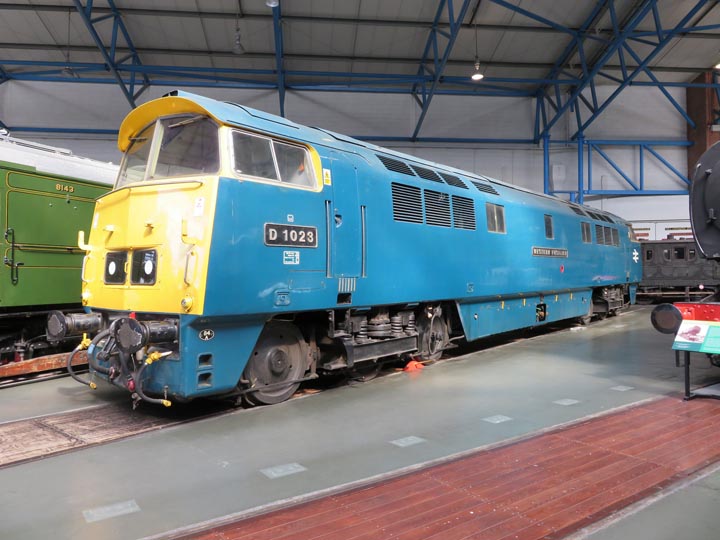Dirty Tricks
 This is a “Western” class diesel at present on
display in the York Railway Museum. One thing I quickly learned while Assistant Station Manager, British Railways, Reading, was to look after yourself first. It was vital to keep the station fluid even at the expense of other stations or yards in the area. This was particularly important at Christmas time when we would have a heavy influx of trains of parcels post vans. Each van had to be sorted through and the Reading parcels extracted. Everyone worked 12 hour shifts and tempers quickly became flared. Reading always had a great number of parcels vans for Redhill on the Southern Region. Reading was on the Western Region and we very rarely spoke to each other. At Christmas time the problem became acute. I had about six vans for Redhill in a siding, known as the Spur, just outside the station and another five Redhill vans in a siding in the station. There was no other space to store vans anywhere. It was Saturday afternoon and I was at my wits end. I spoke to Benny in the Control Office (RTC or dispatcher in Canada) and explained the situation and said I was going to have to put a complete block on Reading. Benny quickly called me back: “Redhill will take the six vans on the Spur and there is a Redhill guard in Reading available to work back. The loco department have a spare locomotive and a Reading crew which should be by you shortly on their way to pick up the vans on the Spur.” “That’s fine but I still need to get rid of the five vans in the station.” “Sorry they can’t take them.” I put the phone down and rushed out of my office which was close to where the five vans were stabled and gave the washout signal to the light engine which was just rumbling through. The Redhill guard was in the cab. I told the crew to pick up the five vans in the station, go to the Spur, pick up the remaining vans then take the lot to Redhill. The guard objected that he was only supposed to take the vans stabled on the Spur. I explained that the instructions had been changed but he wasn’t convinced. “Let’s go into my office and I’ll phone control and confirm it” He watched my every move while I picked up the phone and made a great play of phoning London. “Hello Control. Benny, this is Colin Churcher, Reading, I have the guard for the van special to Redhill here. He wants to confirm that he is to take the five vans from the station as well as the vans on the Spur.” Pause while I nodded my head and mumbled the occasional “Yes”. “OK, thanks I’ll tell him” I hung up and told the guard that Control had confirmed that it was OK to take all of the vans to Redhill. What he didn’t know was that I had in fact dialled a phone on the other side of the station and playacted the whole thing. The guard picked up the vans in the station and emptied the Spur. The next morning my boss came up and said: “You did a great job of clearing up those vans. How did you manage it?” I replied innocently, “They said they would take them.” Of course, there was the inevitable “Mr. Churcher, please explain,” message from London but this came after Christmas and memories were, by that time, short. I was devastated and explained that I must have misunderstood the message from Control. Turns out that, not only could Redhill not handle the additional five vans but the train was too long for the platform and the station was effectively shut down for an hour or so. In a way it was a quid pro quo. We had no steam locomotive water facilities at Reading and insisted that all trains be diesel hauled. Of course they sent a steam locomotive through and one of my platforms was blocked for almost an hour while we put about six inches of water into the tender with a garden hose. But at least my station stayed fluid. Ottawa Valley Associated Railroaders The Interchange March 2015 |
